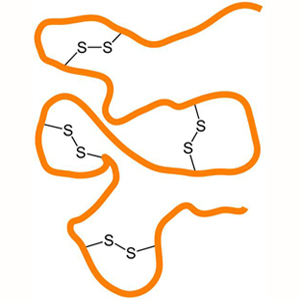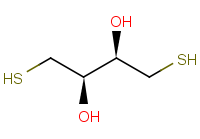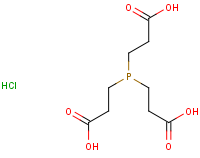Disulfide bond (−S−S− bond) is a kind of covalent bond between S atoms. It plays an important role in the formation of three-dimensional structure of protein molecules. In order to identify the primary structure of protein, the disulfide bond must be opened firstly. DTT and TCEP-HCl are commonly used for the reduction of disulfide bond, then what is the difference between them?

4-Dithiothreitol (DTT)
DTT is a compound in which C-1 and C-4 hydroxyl groups of threitol are substituted with sulfhydryl groups. It is often used in the reduction of disulfide bond in protein, and can prevent the formation of cysteine intramolecular or intermolecular disulfide bonds.

DTT has two sulfhydryl groups, its function can last for 3~7 days, and the volatility is not strong. However, disulfide bonds embedded in the protein structure (solvent inaccessibility) are often unable to be reduced by DTT. On the contrary, according to the reduction rate, the embedding degree of disulfide bond can be judged. In addition, Ni can be reduced by DTT. So in the purification of protein tagged with “His” using Ni column, the use of DTT should be avoided.
Tris(2-carboxyethyl)phosphine hydrochloride (TCEP-HCl)
TCEP-HCl is the best one in the trivalent phosphorus derivatives. It is a colorless and tasteless reductive substance which is easily soluble in water. It has high stability in air and aqueous solution, and slightly affected by temperature and concentration. TCEP is a partial reductant which has little side reaction with other amino acids except cysteine, and can be used in acidic conditions (even pH=3). TCEP has the advantages of high solubility, low toxicity, good stability in acidic and alkaline solution. It has a stronger reduction capacity than DTT, and its function can last for 2~3 weeks. TCEP is recognized as a good alternative to DTT.

DTT and TCEP-HCl can be substitute for each other, but with different effects. Compared with DTT, TCEP has a stronger reduction ability, and it is more selective; TCEP is more stable both in acidic or alkaline conditions; it has no charge and has no impact on follow-up experiment. So it is often preferred in the research of protein chemistry and proteomics.
Copyright © Suzhou Yacoo Science Co., Ltd. All Rights Reserved
Friendly Links :
online service